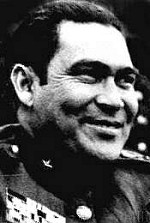Fulgencio Batista
|
|
- This article is about the former Cuban President. For the professional baseball player, see Miguel Batista. For the professional wrestler, see David Bautista.
General Fulgencio Batista y Zaldívar (January 16, 1901 – August 6, 1973) was the de facto leader of Cuba from 1933 to 1940 and the country's official president from 1940 to 1944 and again from 1952 to 1959.
| Contents |
Youth and first rule
Batista was born in Banes, Cuba in 1901 and considered mulatto (mixed African and Spanish blood). He joined the army in 1921. Sergeant Batista led the 1933 "Sergeants' Revolt" which replaced the Provisional Government of Carlos Manuel de Céspedes, who had previously ousted Gerardo Machado. Ramón Grau was made president and Batista became the Army Chief of Staff and effectively controlled the presidency. Grau was president for just over 100 days before being replaced with Carlos Mendieta y Montefur (11 months), then Jose Barnet y Vinajeras (5 months), and then Miguel Gomez y Arias (7 months) before Federico Laredo Brú managed to rule from December 1936 to October 1940.
In October, Batista was popularly elected as President of Cuba. During his tenure, he drafted the 1940 constitution (later approved by President Grau,) widely regarded as a progressive document with regards to labor, unemployment, and social security, and implemented several liberal economic reforms. In 1944, Batista was forbidden by law to seek re-election by term limits and was succeeded by Grau. Batista retired in Florida, before returning in 1952.
Second rule
Batista staged a bloodless coup d'état on March 10, 1952, removing Carlos Prío Socarrás (elected in 1948) and becoming President three months before new elections were to be held. The new government received diplomatic recognition from the United States, a number of American corporations continued to swell in Cuba, and the island became a major tourist destination, attracting unprecedented prosperity for the island. In addition, the public was somewhat accepting of the coup at first, hoping Batista would restore stability to the island after the political violence, labor unrest, and government corruption that had occurred during Prío's tenure. But the economic depressions of the 1950s and Batista's corruption, particularly his unsettlingly close relationship with the Havana Mafia, saw a rise in opposition to his regime, particularly from poorer Cubans, advocates of liberal democracy who viewed his presidency as unconstitutional and unacceptable, and middle-class Marxist thinkers.
Opposition
Among the numerous opponents to Batista was Fidel Castro. Castro had attempted to challenge the coup judicially but his petition was refused. Castro was imprisoned after he led a disastrous attack on the Moncada Barracks in July, 1953. In an attempt to discourage further rebellion, Batista also displayed the corpses of guerrillas killed by the Army on Cuban television. However, rather than frightening the Cuban populace, such actions only further contributed to Batista's growing unpopularity.
With pressure from the Jesuits, Batista decided to free Castro early and he was released in a general amnesty in May 1955 and went into exile in Mexico and the United States where he plotted another attempt at revolution. Castro's return to Cuba as head of the 26th of July Movement was marked by another disastrous attack in December, 1956. Only Castro and eleven others survived to retreat into the mountains and from there wage a guerrilla war.
In May 1958, Batista launched a major assault against Castro and the other rebel groups (unaffiliated with Castro). Despite being outnumbered (his men numbered fewer than 100), Castro's forces scored a series of victories, aided by massive desertion amongst Batista's army. During this time period, the U.S. essentially broke off relations with Batista, stating that it sought a peaceful transition to a new government. Against this backdrop of growing civil war, Batista, constitutionally prohibited from continuing as president, held an election in which his preferred candidate Carlos Rivero Aguero defeated Grau. On January 1, 1959 Batista and Rivero fled the country to the Dominican Republic, and Castro's forces took Havana.
Exile
Batista moved to permanent exile in Portugal and Spain, dying in Guadalmina, Spain, in 1973.
Batista is the author of Cuba Betrayed and The Growth and Decline of the Cuban Republic.
| Preceded by: Federico Laredo Brú | President of Cuba First Mandate 1940 – 1944 | Succeeded by: Ramón Grau |
| Preceded by: Carlos Prío Socarrás | President of Cuba Second Mandate 1952 – 1959 | Succeeded by: Anselmo Alliegro Template:End boxbe:Фульхэнсіё Батыста da:Fulgencio Batista de:Fulgencio Batista es:Fulgencio Batista fr:Fulgencio Batista it:Fulgencio Batista nl:Fulgencio Batista ja:フルヘンシオ・バティスタ nn:Fulgencio Batista no:Fulgencio Batista pl:Fulgencio Batista pt:Fulgêncio Batista fi:Fulgencio Batista sv:Fulgencio Batista |

